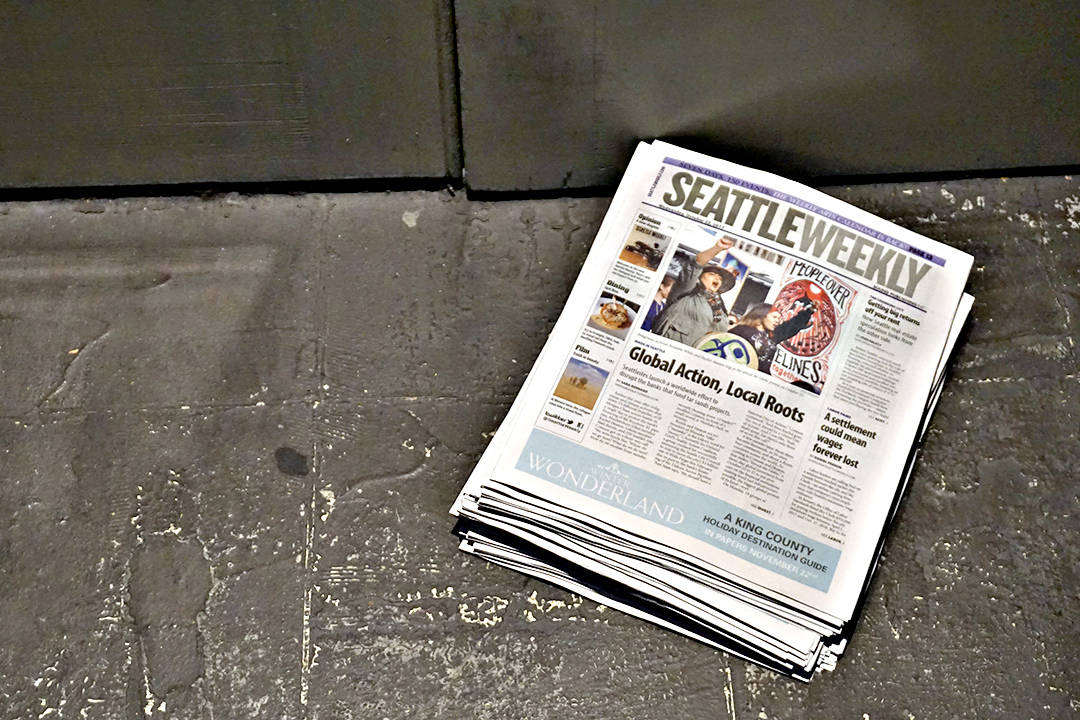There is a neat little trick in the first scene of Terra Incognita, the latest work of playwright Benjamin Benne, currently playing at Annex Theatre.
On a stark, white stage sit the play’s two main characters, Sheila and Nadia. Nadia is a recovering alcoholic: “Twelve days, three months, one year” sober, she says. Sheila is a counselor with a soothing bedside manner. It is their first meeting, at the suggestion of Nadia’s AA sponsor, and Sheila wastes no time in getting personal with a litany of probing questions. “Has anyone in your family been addicted to drugs?” she asks. “Have you ever witnessed domestic abuse?” she asks. “Have you ever been physically abused?” she asks. Nadia flinches at the last, then says “No.” It is an obvious lie, and soon after Nadia becomes combative. So Sheila sets down her notebook and asks, “Can we just breathe?”
Nadia, tightly wound and suspicious, relents after Sheila tells her that we all carry around old air in our lungs—for hours, days, weeks. And then they breathe together. Slowly. Deeply. And if you are in the audience of this at-times-quietly powerful production, you can’t help but breathe along.
It is in intimate moments like this that Benne’s talents as a storyteller are laid bare, quite literally. The production, directed by Pilar O’Connell, is minimal; the scenic design by Mary Ann Keeney consists of a white floor and wall, with spare furniture added as needed. Projections by Leo Mayberry are used to convey place and mood as the play progresses, but the scenes that lean almost entirely on Benne’s words—as well as two impressive performances by Lillian Afful-Straton as Nadia and Gretchen Douma as Sheila—are the heart of a story that explores the difficulties of letting go of the past.
Most of those scenes take place in Sheila’s office during the first act of this uneven two-act play. It is there, throughout a series of meetings, that Nadia slowly reveals her story, that of a young black woman with no job and no friends. Sheila is alone as well, we learn—a divorcee who has little contact with her children, happy to spend her days working in her Seattle practice, clutching her pearls. Those pearls once belonged to her grandmother, a memento of a past now out of reach. Nadia has her own reminder: a tattoo bearing the name of her ex-boyfriend, Xavier, killed in a drunk-driving accident a little over a year ago.
Despite their different backgrounds—one older and white, the other young and black—the two slowly grow to like each other. These affections, though, are hard-won, and the struggle makes up the bulk of a very moving first act. As individuals, Afful-Straton and Douma fully inhabit their roles, bringing a naturalism to the characters that imbues even the most minor actions—a sigh, a jittery leg—with meaning. Together they are hypnotic, drawing toward each other and pushing away throughout a script deftly woven with the politics of race and privilege.
It is only when the duo is pulled apart that the spell is broken and the play sputters. At times the talent is to blame—as is the case in a scene between Nadia and Simon, a square job-placement counselor played like a brick by Jordan-Michael Whidbey. A later turn as Nadia’s ex-boyfriend shows that Whidbey has some dexterity and verve, but his Simon waits to deliver his lines like he’s waiting for a bus.
The biggest obstacle, though, is found in the later pages of Benne’s script, which suffers badly when its protagonists strike out on their own. Benne incorporates a kind of magical realism early on—by way of a troublesome crow—but in the second act, the script goes almost completely off the rails, employing zombies, angels, and hallucinations to convey the power of its protagonists.
It’s all a bit much and unnecessary, really, given the power that Benne can conjure with a simple breath.
mbaumgarten@seattleweekly.com








